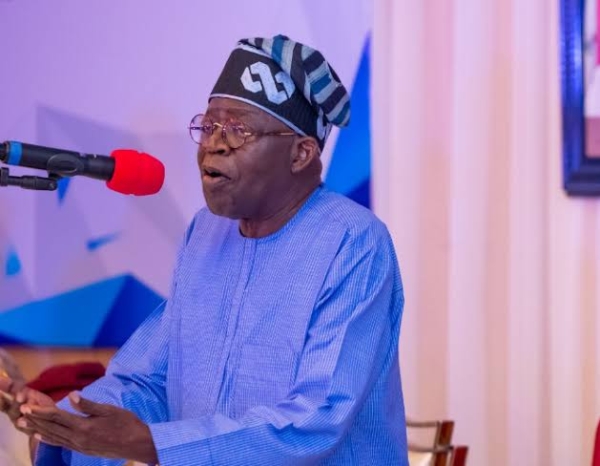OPENING ADDRESS DELIVERED BY PRESIDENT BOLA AHMED TINUBU GCFR, AT CONSULTATIVE WORKSHOP ON LIVESTOCK REFORMS IN NIGERIA ON 24 OCTOBER 2024 AT THE STATE HOUSE BANQUET HALL, ABUJA
Protocol
The Minister of Agriculture, the Co-Chairman, Presidential Livestock Reforms Implementation Committee, Prof Attahiru Jega, OFR, Ladies and Gentlemen
I am delighted to join you today at this consultative workshop dedicated to one of the most critical aspects of our nation's development: the livestock sector. This area of our economy is close to my heart and central to our administration's vision. We owe ourselves and future generations the mission of accomplishing it in our time.
I congratulate the Presidential Livestock Reforms Implementation Committee for facilitating this essential dialogue between stakeholders and the public.
Our shared mission is clear: we aim to transform the livestock sector from its current subsistence model into a thriving, commercialised industry, an industry that significantly contributes to Nigeria's Gross Domestic Product and provides decent jobs and sustainable livelihoods for our growing population.
The potential is immense: With 563 million chickens, 58 million cattle, 124 million goats, 60 million sheep, and 16 million pigs, Nigeria is the leading livestock producer in West Africa. Yet, despite this vast resource, we face stark realities. Our annual production of animal-source foods, like milk at 0.7 billion litres, meat at 1.48 million Tonnes and eggs at 0.69 million metric Tonnes, falls far short of our needs. Our per capita consumption levels—8.7 litres of milk, 9 kg of meat, 3.5kg or 45 eggs per year—are troublingly low compared to global averages. These are 44 litres of milk, 19 kg of meat and between 160 and 180 eggs per year.
What is more worrisome to me is the average milk yield by cow breeds managed by our pastoralists: it is a mere 0.5 to 1.5 litres per day, compared to a global average of 6.6 litres per day. We can do much better!
The long-term neglect of the livestock sector has weighed heavily on the country's import bills, with milk and dairy products accounting for $1.2-1.5 billion.
In response, I inaugurated the Presidential Livestock Reforms Implementation Committee on July 9, 2024, to address these multifaceted challenges and unlock the potential for increased investment opportunities, employment, livelihoods, and income. The committee has diligently submitted an inception report, a foundation for our collective efforts moving forward.
Our vision is to create an environment where Nigerian farmers, herders, and other stakeholders coexist peacefully and have access to finance, modern technology, and vibrant markets. We envision revitalised rural communities where no Nigerian goes to bed hungry. We are committed to achieving food and nutrition security and transforming the livestock sector into a substantial foreign exchange earner for our beloved country.
However, we must confront the livestock sector's complexities to reach this vision. The debate between ranching and open grazing has often been politicised and polarised. We must transcend these divisions and work collaboratively toward practical solutions.
Let us view the current challenges as opportunities for economic and socio-cultural development—in line with our Renewed Hope Agenda. Let me use this opportunity to call on the state Governors to key into the livestock reforms and expand frontiers for the needed prosperity of Nigerians, irrespective of our unique diversities.
We have created the sector-specific Ministry of Livestock Development to harness the sector's investment opportunities fully. To ensure the ministry's smooth take-off, I have directed the Minister of the Federal Capital Territory to expedite renovations for a functional office, signalling our commitment to prioritising this crucial area.
Livestock development is not merely an economic imperative but a social and moral one. It is our duty to our children and future generations to get this right. Let us unite our efforts and creativity to build a brighter future for Nigeria’s livestock sector.
The inception report from the Presidential Livestock Reforms Implementation Committee is rich in insights and strategies for fostering a productive and resilient livestock sector. I commend the committee's members for their tremendous work and expect a robust and constructive collaboration between the committee and the new Ministry of Livestock Development to ensure that these reforms blossom into reality.
In closing, let us create a vivid picture of the future we want to see—a robust livestock sector that feeds our communities, empowers our farmers, and strengthens our economy. I urge each of you to participate actively in this endeavour.
Together, we can elevate Nigeria to its rightful place as a leader in sustainable livestock production. Let us work together to realise this dream because the future of our livestock industry is not merely a vision; it is a promise we can fulfil together.
With that, I proudly declare this Consultative Workshop open to God's glory and for the benefit of our country and humanity.
Thank you all.


